The Transportation Cybersecurity Center for Advanced Research and Education (CYBER-CARE), founded in 2023 and led by the University of Houston, recently sponsored two workshops focusing on cyber-security in Washington, D.C.
In addition to UH, the consortium includes Embry-Riddle Aeronautical University, Rice University, Texas A&M University-Corpus Christi, the University of Cincinnati and the University of Hawai‘i at Mānoa. The effort is supported by a $2 million USDOT grant for this first year with anticipated total federal funding of $10 million in its first five years of operation.
CYBER-CARE Director Yunpeng "Jack" Zhang, Ph.D., associate professor of computer information systems and information system security in the Technology Division, was pleased at the turnout and impact of the joint workshop event.
Zhang said the goal of these conferences was three-fold: "To let people know what we have done, what we are doing and what we will do [going forward]."
"We really want to educate the public about the importance of cybersecurity, as well as the way it's all around us,” he said. “It's not something far away from us, or far away from our infrastructure. In my opinion, our infrastructure is one of our most important areas to protect."
According to Zhang, entities such as transportation systems, financial institutions, oil and gas distribution networks and smart power grids see cyberattacks – virtual attempts by bad actors to breach secure areas of operation – happen every day. Many of these companies, however, don't want the public to know this.
"They worry that this knowledge can harm their stock values and their reputation in the public eye," he explained.
Even on the home front here at UH, cybersecurity threats aren't uncommon.
"We just met with the IT department last week," Zhang said. "Here in the Technology Division, we have a very strong IT department. They do a lot of work to protect our network and protect our computing resources for everyone [who uses them]. We avoid many ransomware attacks and other security breach attempts because they have excellent tools, policies and rules in place to protect all of us."
That protection, in turn, allows this research to continue further. It also helps promote further cybersecurity education for leaders, policymakers, and the general public.
"Cybersecurity is incredibly important in transportation as well as in AI," he said, which is why both topics were included as areas of focus in the workshops. "Unfortunately, neither are inherently secure."
Fields and resources at risk include transportation systems, oil and gas pipelines and their respective control equipment, smart power grids, healthcare, water supply systems, and public safety features. Cyberattacks on these resources can lead to power outages, general service and supply interruptions, public health and safety risks, and even terror attacks. This, he emphasized, is why CYBER-CARE's collaborative research is so vital to the modern landscape.
"We really look forward to extending our network of partner universities. Hopefully as we continue to host these workshops, we'll have more people and more universities join us. We invited our keynote speaker, NSF Office of Advanced Cyberinfrastructure Program Director Juan Jenny Li, as well as TxDOT Director V, Jianming Ma. They are policy and decision makers," Zhang said of the successful D.C. event. "We invited them to – and would like to continue involving them in – our workshops, events and activities so that they can see firsthand the importance of continuing this grant-funded research work."
